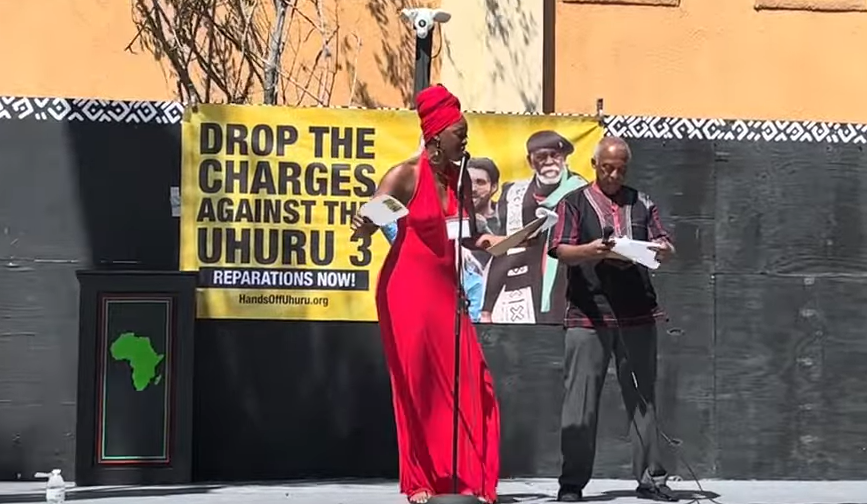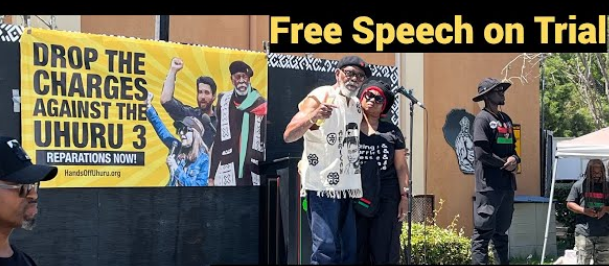By Hands Off Uhuru
Photos: Hands Off Uhuru\YouTube Screenshots
Day one of the free speech “trial of the century” began with a press conference across the street from the Federal Courthouse in Tampa. Free speech defenders and social justice activists from across the U.S. expressed their support for the Uhuru 3—Chairman Omali Yeshitela, Penny Hess and Jesse Nevel, falsely accused of being secret pawns in a Russian government conspiracy to “sow discord” and “interfere in elections.”
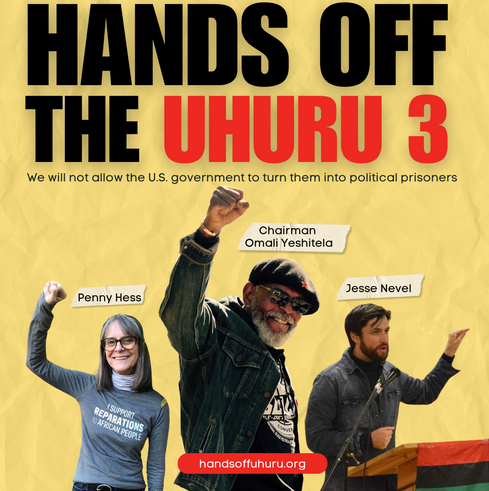
The press conference was hosted by Mwezi Odom, Chair of the Hands Off Uhuru! Campaign. She declared that the government’s false accusation that the Uhuru 3’s call for reparations, a petition against the U.S. charging genocide against Black people and the group’s opposition to U.S. wars were carried out under the control of the Russian government to be a “racist denial of Black people’s agency. We can think for ourselves and define our own agenda!”
Jill Stein, Green Party candidate for U.S. president, was there, herself having also been targeted for her views on Russia and critical of U.S. war policies. Stein declared, “The attack on the Uhuru 3 is fundamentally an attack on free speech, on our right to oppose endless wars and economic oppression abroad, aka colonialism, it is an attack on our right to oppose the cost of these endless wars at home, namely economic austerity. No one should think that being white is a protection against resurgent fascism, everyone is at risk from this assault on democracy and we need to fight for the Uhuru 3 together.”
Charles Barron, former New York City Councilman, former State Assemblyperson, former member of the Black Panther Party and leader of Operation Power warned, “They made a big mistake here, messing with Omali Yeshitela, messing with the son of Malcolm X, the son of Martin Luther King, the son of Dessalines, the son of the Black Panther Party, all those who are fighting for justice and they’re doing this now because they’re desperate. We are winning.”
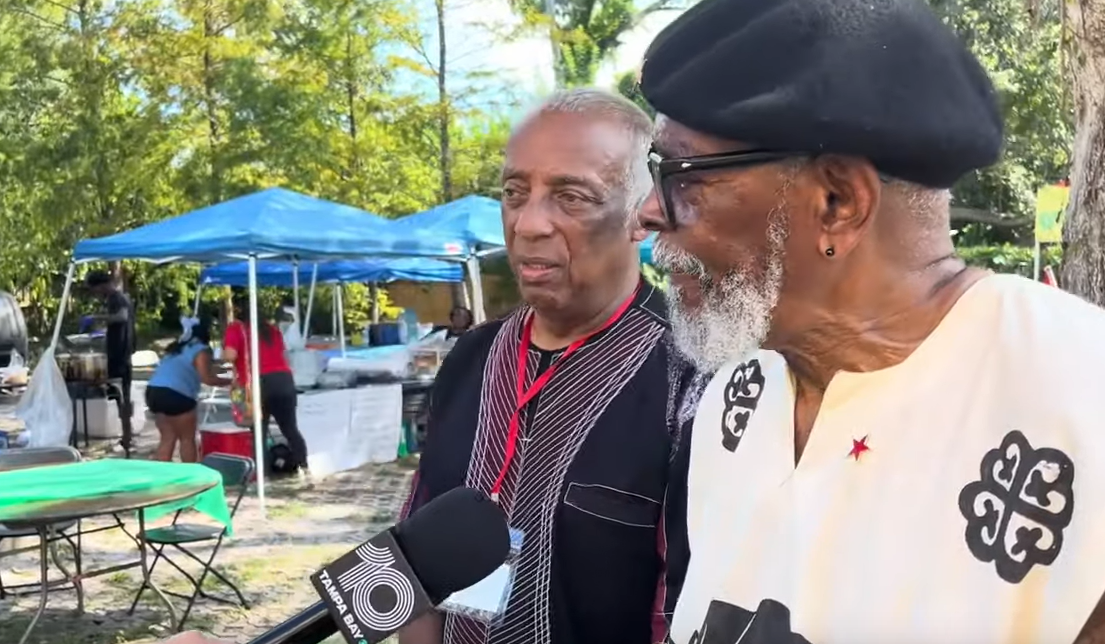
Efia Nwangaza, Executive Director of the Malcolm X Center for Self Determination and of their community radio station in Greenville, South Carolina had traveled to Tampa to support the Uhuru 3. She is a veteran leader of the Student Nonviolent Coordinating Committee (SNCC), the organization responsible for registering Black voters throughout the south in the 1960s.
Chairman Omali was the Florida field organizer with the Student Nonviolent Coordinating Committee, braving lynchings and violence in order to win voting rights for Black people. Nwangaza reflected, “We’ve seen this movie before and it’s as bad now as it was in 1965, when they tried to silence SNCC and Julian Bond. Black people have been resisting mind control in this country since the first African was snatched off the Continent and slammed down on North America.”
Pam Africa came from Philadelphia where her MOVE Family Africa was twice the target of a violent assault by U.S. police and military forces, including the 1985 aerial bombing of their home which killed nine children, women and men and burned over 65 houses to the ground. Sister Pam declared, “We are not coming here looking for justice, we are coming here to expose injustice. This is not something they thought out very well. They’ve given our brother, the Uhuru organization, each and every last freedom fighter out here, an international platform to expose exactly what these people do and the extent to which they do it.”
Caleb Maupin brought the support of the Center for Political Innovation, an early and unwavering defender of the Uhuru 3, who has taken this case out to the world. He advised, “Rather than persecuting Chairman Omali, they should be studying what Chairman Omali has achieved. Rather than persecuting the African People’s Socialist Party and Uhuru Movement they should be looking into what they’ve done to improve the lives of the people in these cities, studying these policies and if they want to win, that’s what they should be doing, not playing these silly games about Russia.”
Benjamín Prado, Under-Secretary of Unión del Barrio, brought a contingent from their base in southern California. “As an organization that has a 40-year fraternal relationship with the African People’s Socialist Party, it is clear to us that this is an attack on all of us, not only an attack on the African community, it’s an attack on the Mexican community, because we have an absolute right to express our thoughts, to express our ideas and bring this message of unity among our people. What is on trial is our democratic rights, our human rights, and as they say, our civil rights.”
Jacqueline Luqman brought a statement from Ajamu Baraka, Chair of Black Alliance for Peace that read in part, “We declare that the Black Alliance for Peace condemns the federal indictments of the Uhuru 3 and the denial of their fundamental human rights to speech, association, information and political dissent, all things that are supposed to be free to us to express in this alleged bastion of democracy. It is only in the imagination of white supremacists, that African people would need smart white people in Russia to guide our people in movements to oppose the U.S. / E.U. NATO proxy war on Russia, and analyze and comment on all aspects of U.S. foreign policy.”
Zaki Baruti of the Universal African People’s Organization, who came to Tampa from St. Louis, predicted that, “We will be victorious! Malcolm X said of political parties, one is a wolf and one is a fox, either one will eat you. That money being used on genocide, should be used for reparations for Black people for the years of enslavement and the ongoing oppression that occurs in this country. To that end we stand totally in solidarity with the Uhuru Movement and we will be victorious.”
Kamm Howard, leader of Reparations United, traveled from Chicago to attend the Uhuru 3 trial. He stated, “Although this is the opening day of the trial of the Uhuru 3, in actuality it is a continuing day of a 400-year-old trial against the United States government for the genocide of African people.”
Betty Davis, leader of the New Abolitionist Movement and member of the Black Is Back Coalition for Social Justice, Peace and Reparations came from New York City to speak on behalf of political prisoners. “I come to challenge the country that has more political prisoners than any other country on Earth. Regardless of whether we agree on every single principle, unless we have a right to speak our truth, we are not human, and this country claims to have settled what it means to have human rights. You must support the Uhuru 3! Free all the political prisoners in death camps in this country!”
Finally, Mwezi Odom read a statement of support from Jenipher Jones, attorney with the Leonard Peltier Ad Hoc Committee. “We stand in unwavering solidarity with the Uhuru 3 and urge their acquittal for the politically motivated charges brought by the U.S. government.”
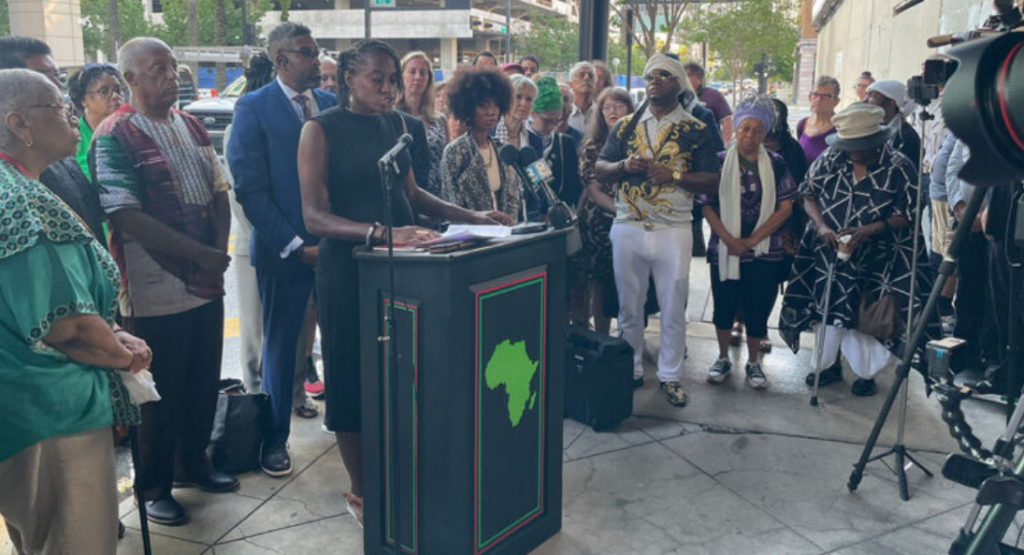
Jury selected
Following the press conference, supporters filed into the Federal Court building. The trial courtroom was reserved for the 80 potential jurors, so family and friends of the Uhuru 3 were seated in an overflow room to observe the proceedings on video. District Judge William Jung began by urging potential jurors to do their peacetime service to their country by serving on jury duty. He said the jury candidates came from six or seven counties, some as far as two hours away from Tampa.
Jury selection began with introductions, each potential juror stating their name, city of residence, level of education, employment, marital status, children, employment of family members and past military or jury service. Then Judge Jung asked a series of questions purportedly to reveal any prejudices that might affect a juror’s impartial assessment of testimony or evidence in the case.
He asked if anyone had ever been engaged in social protest. One said they had protested the war in Viet Nam. Another said they had protested Israeli genocide. Both of these were dismissed from serving as jurors in the Uhuru 3 case.
Then Judge Jung asked about any hardships potential jurors faced that would let them be excused from the jury and then had them leave the courtroom while the government attorneys and the Uhuru 3 attorneys made their requests to dismiss selected jurors.
Finally a panel of 12 jurors and 6 alternates were agreed upon.
Opening arguments
The government went first. They exposed how all their charges are nothing but pure political speech. The so-called “overt acts” of the indictment are:
- Chairman Omali traveling to Moscow to speak on behalf of the African Nation at a conference hosted by a Non-Governmental Organization (NGO) titled, “The Dialogue of Nations,” which was also attended by delegates from around the world including from Ireland, Spain, Hawaii, Puerto Rico, Africa and hundreds of other people including from dozens of anti-war organizations in the U.S.
- Publishing a petition charging the U.S. with genocide
- Speaking and organizing at U.N. hearings for reparations to African people around the U.S.
- Publishing an article opposing the ban on Russian athletes in the Olympics
- Running for public office on a reparations platform
- Speaking out against the U.S./NATO proxy war against Russia
Then the Uhuru 3 attorneys delivered powerful and moving narratives showing that the positions and views of the Uhuru Movement stem entirely from the self-defined agenda and experiences of the African liberation struggle.
Chairman Omali’s attorney, Ade Griffin clearly stated that “Omali Yeshitela is innocent. Penny Hess is innocent. Jesse Nevel is innocent. This case is about censorship. It’s an attack by the U.S. government to censor political beliefs of the African People’s Socialist Party.” She told the jury that this trial will be a unique opportunity to come to know about the history of Omali Yeshitela and the political perspective of the African People’s Socialist Party (APSP) and have an intimate understanding of his life long dedication to the worldwide movement to the liberation of African people. She said, “You will come to know him as the Chairman.”
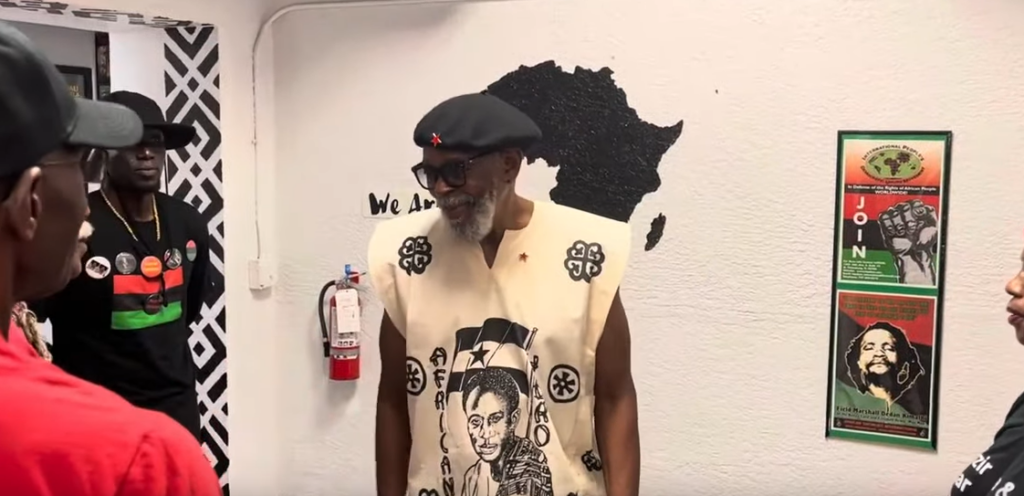
Griffin reviewed some of Chairman Omali’s history. He was born in 1941 in St. Petersburg, Florida. In 1961 he joined the U.S. Army and was stationed in Berlin, Germany. He worked for the St. Petersburg Times at the time of the Watts Rebellion. He has written 15 books and pamphlets. In the 1960s he joined the Student Nonviolent Coordinating Committee (SNCC). In 1968 he founded The Burning Spear newspaper. He has protested every U.S. war that has taken place during his lifetime.
Chairman Omali founded the APSP in 1972 to promote peace, dignity and the right of African people to build a prosperous future. He fought for reparations. He’s dedicated his life to this work. In 1976 he formed the African People’s Solidarity Committee (APSC) made up of white people for reparations. The APSP made reparations a household world and held 12 tribunals, starting in 1982 based in international law.
Next up, attorney Leonard Goodman, representing Penny Hess, shared some of her story. Penny Hess is a 78-year-old woman from Louisville, Kentucky. She heard Omali Yeshitela talk about the history of African people and talk about colonization and enslavement. She moved and spent the next 50 years working for the APSP.
She volunteered for a long time because she was beholden to the cause. She worked as a waitress and a secretary. She wrote the book, Overturning the Culture of Violence in 2001 which talks about the struggles of African people and puts forward heroes like Harriet Tubman and Marcus Garvey.
Goodman explained how the APSP does community work like building farmers markets, community economic development, health programs like a doula program and more. He explained how they have held the same principles for 50 years and did not change. He said, “It’s a puzzling theory—the government argues that in May of 2015 they are saying the same message but now saying it for Russia like they became mercenaries.”
He argued that the real crime is that they are critics of U.S. foreign policy. “So you may agree or disagree with the APSP. But there is no evidence that Penny Hess compromised her principles. I ask that you find Penny Hess not guilty.“
Finally, Jesse Nevel’s attorney Mutaqee Akbar spoke to the jury. He explained that “Uhuru” means freedom and independence. Freedom to protest, speak, stand with others, speak up for a community that’s voiceless. He reiterated, “All three are innocent.”
He described how, in 2008 Jesse Nevel came to St. Petersburg, Florida to attend the University of South Florida. In 2010 Omali Yeshitela and Penny Hess came onto campus and he heard them speak. He heard the message about the white community being allies and committed to the organization. In 2014 he became the chair of the Uhuru Solidarity Movement and he started talking to people and doing work.
Akbar concluded, “All in all, the APSP and Uhuru have positions and believe in freedom of speech. The government is overreaching.”
What’s next
On September 4, the second day of the trial, prosecutors will begin to present their so-called “evidence” and to call witnesses to back-up their bogus case. That portion of the trial is expected to go for a week. The entire trial is expected to go for approximately 3 weeks. Come to Tampa and stand with the Uhuru 3! Pack the court and put the State on trial!
